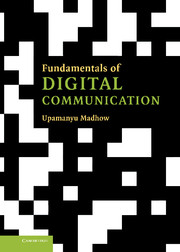
-
Select format
-
- Publisher:
- Cambridge University Press
- Publication date:
- June 2012
- March 2008
- ISBN:
- 9780511807046
- 9780521874144
- Dimensions:
- (246 x 189 mm)
- Weight & Pages:
- 1.262kg, 518 Pages
- Dimensions:
- Weight & Pages:
You may already have access via personal or institutional login
Book description
This is a concise presentation of the concepts underlying the design of digital communication systems, without the detail that can overwhelm students. Many examples, from the basic to the cutting-edge, show how the theory is used in the design of modern systems and the relevance of this theory will motivate students. The theory is supported by practical algorithms so that the student can perform computations and simulations. Leading edge topics in coding and wireless communication make this an ideal text for students taking just one course on the subject. Fundamentals of Digital Communications has coverage of turbo and LDPC codes in sufficient detail and clarity to enable hands-on implementation and performance evaluation, as well as 'just enough' information theory to enable computation of performance benchmarks to compare them against. Other unique features include space-time communication and geometric insights into noncoherent communication and equalization.
Reviews
'Madhow is a highly established researcher with a good style that is easy to read.'
Professor Elza Erkip - Polytechnic University, Brooklyn
Contents
Metrics
Altmetric attention score
Full text views
Full text views help Loading metrics...
Loading metrics...
* Views captured on Cambridge Core between #date#. This data will be updated every 24 hours.
Usage data cannot currently be displayed.
Accessibility standard: Unknown
Why this information is here
This section outlines the accessibility features of this content - including support for screen readers, full keyboard navigation and high-contrast display options. This may not be relevant for you.
Accessibility Information
Accessibility compliance for the PDF of this book is currently unknown and may be updated in the future.


